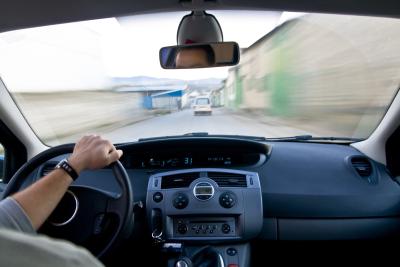A parking brake is designed to add an extra element of holding power to help the transmission keep a vehicle in place when parked. The parking brake mechanism is integrated with the regular braking system in some cases, but not always. Driving with the parking brake on can present a potential problem for the brake system.

The parking brake uses the existing brake system to some extent, whether it is a brake drum, rotor, pad or disc. Many vehicles use a separate set of elements in their parking brake design that still apply pressure to an existing brake drum or brake disc.

In most cases, the parking brake is activated with a lever located inside the vehicle. This lever is attached to the brake system by a steel cable that ties into the existing brake line for the drive axle or activates a separate mechanism to apply braking function.

Using the parking brake while driving may cause wear to the linings of the vehicle’s main brakes. The moving wheel causes friction when the parking brake is applied, wearing away the brake pad or disc.

Although driving with the parking brake on is not likely to cause any major damage to the engine, there is a possibility that the engine’s temperature will rise above safe levels. Most vehicles have a warning light system that indicates high engine temperature; this will alert the driver of a problem. If it's not addressed, it could result in radiator damage or cracked head gaskets, among other issues.

Repair or replacement of the parking brake may be necessary if enough damage has occurred from driving with the brake on. A qualified brake technician should perform any repair or replacement.
